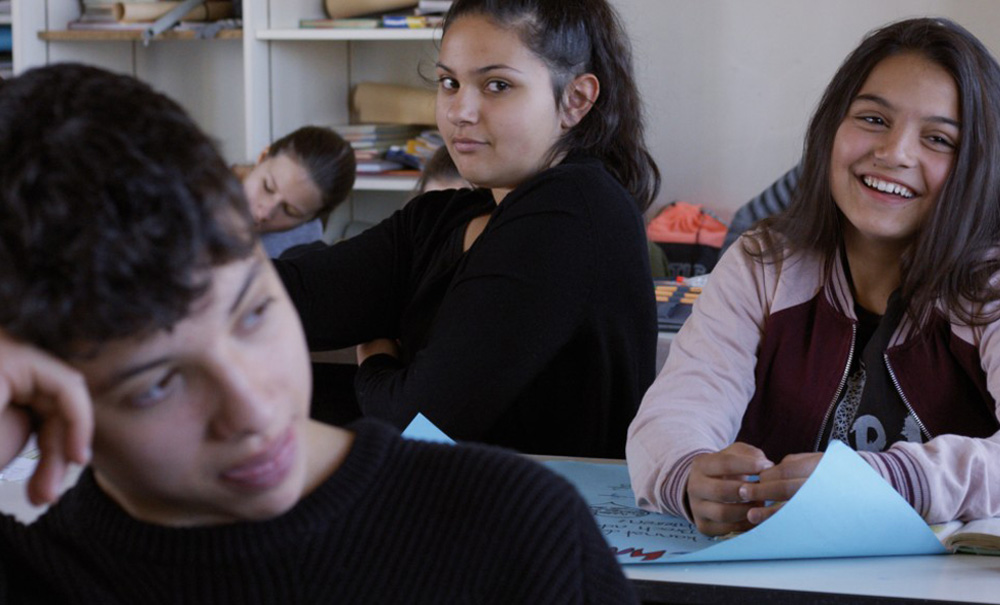You hear the voice of Dieter Bachmann before seeing him in “Mr. Bachmann and His Class,” telling his sixth graders that if they need to rest a little longer, they can put their heads down on their desk for a little while. Director Maria Speth shows it’s still dark out when the kids file onto the bus for school in Stadtallendorf, Germany and while some stop at a local bakery to grab a pastry to get going before the day starts, others still need the shut-eye and as the camera pivots from them to Bachmann at the head of the class, outfitted in an AC/DC shirt and skullcap that not square with what the mind might’ve conjured from his gentle instructions, the classroom is both recognizable in terms of the diversity of the students in the room and entirely unrecognizable in how Bachmann treats them.
When Bachmann approaches education noticeably different in leading with sensitivity and kindness, it’s fitting that Speth acts accordingly with a film that runs three hours and 40 minutes to let a school year unfold as gracefully as the teacher handles the discourse in his class. Although the director gives occasional glimpses into other classrooms, the school itself is a bit of a mystery in terms of how it’s structured to have such an open environment, though it’s far less important than where it is located, a town that once made munitions for the Nazis and had its factories redeployed for consumer goods following World War II, opening up the floodgates for job seekers from far and wide to find opportunity. The student body reflects a place that continues to welcome immigrants, with the majority of Bachmann’s students either the first generation to grow up in the country or having recently moved there, requiring the teacher to facilitate a lesson plan in which they can all feel involved when German is not necessarily their first language.
At first, you think little of the interstitial scenes of the town outside the school that Speth slides in between what occurs in the classroom, but “Mr. Bachmann and His Class” is slyly structured to let the audience experience the same sense of assimilation that the students do. Bachmann and colleagues lament the inconvenience of handing out standardized grades when they’re an insufficient measure of progress for such a broad variety of pupils, and though he might have to explain himself to superiors from the time to time, one is privileged by virtue of Speth and cinematographer Reinhold Vorschneider’s presence to see the progress that the kids make as Bachmann encourages them to engage with one another in conversations that run the gamut from candidly describing their family lives to their religious views, growing more comfortable expressing themselves in front of your eyes.
With a drum set in the corner and a guitar behind his desk, there’s always the threat of Bachmann bursting into song, though it’s never a solo performance and part of the reason you suspect he’s so good with the kids is because, like many of them, this is hardly the life he envisioned for himselff. But when the film both literally and figuratively gradually works its way outside the confines of the classroom, “Mr. Bachmann and His Class” simultaneously allows for all involved to start to be seen as individuals with their own specific interests and a product of a community that’s nurtured them to appreciate the value that they have. Although Bachmann, prone to dropping unexpectedly wise words at a moment’s notices, tells a fellow teacher, “Being with a beautiful woman is overrated because you don’t even notice it anymore,” somehow being around a beautiful educator never gets old.
“Mr. Bachmann and His Class” will premiere at the Berlin Film Festival.




